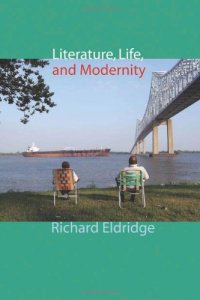
Ebook: Literature, life, and modernity
Author: Eldridge Richard Thomas
- Tags: Literature -- Philosophy. European literature -- History and criticism. Literature and society. Literary form. LITERARY CRITICISM -- Semiotics & Theory. PHILOSOPHY -- Aesthetics. European literature. Literatur. Gesellschaft. Philosophie.
- Series: Columbia Themes in Philosophy Social Criticism and the Arts
- Year: 2008
- Publisher: Columbia University Press
- City: New York
- Language: English
- pdf
Richard Eldridge explores the ability of dense and formally interesting literature to respond to the complexities of modern life. Beyond simple entertainment, difficult modern works cultivate reflective depth and help their readers order and interpret their lives as subjects in relation to complex economies and technological systems. By imagining themselves in the role of the protagonist or the authorial persona, readers become immersed in structures of sustained attention, under which concrete possibilities of meaningful life, along with difficulties that block their realization, are tracked and clarified.
Literary form, Eldridge argues, generates structures of care, reflection, and investment within readers, shaping—if not stabilizing—their interactions with everyday objects and events. Through the experience of literary forms of attention, readers may come to think and live more actively, more fully engaging with modern life, rather than passively suffering it. Eldridge considers the thought of Descartes, Kant, Adorno, Benjamin, Stanley Cavell, and Charles Taylor in his discussion of Goethe, Wordsworth, Rilke, Stoppard, and Sebald, advancing a philosophy of literature that addresses our desire to read and the meaning and satisfaction that literary attention brings to our fragmented modern lives.